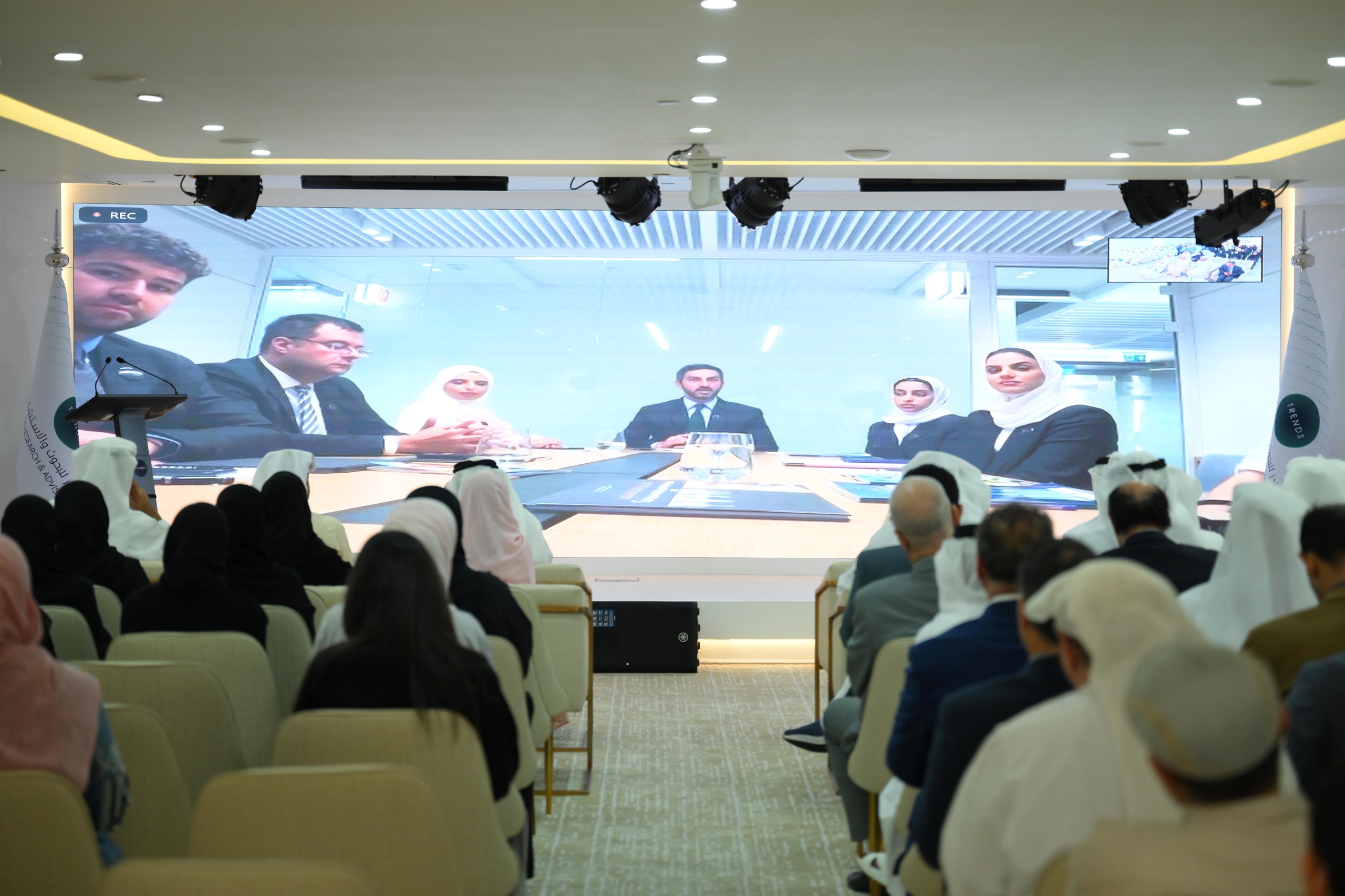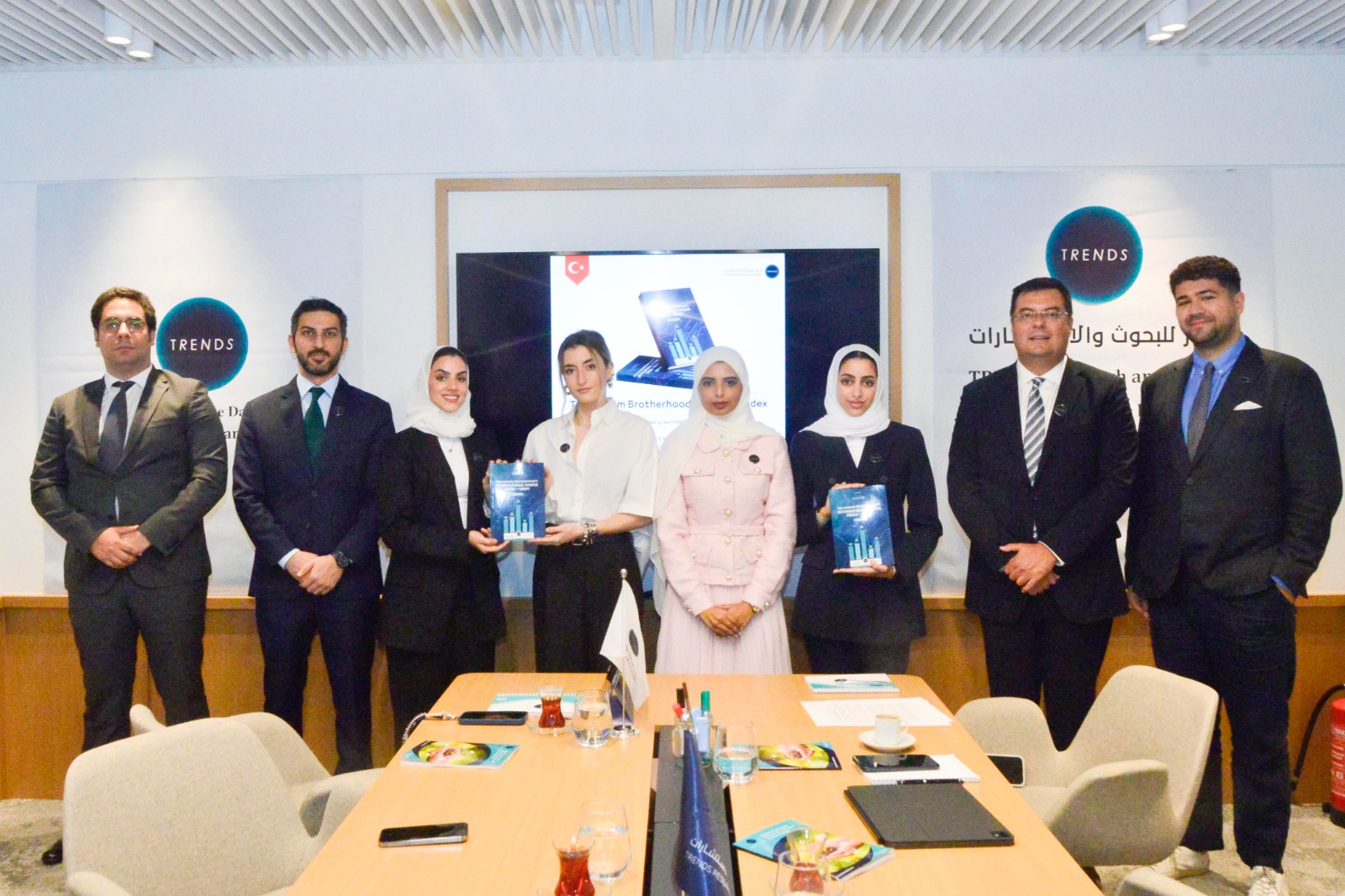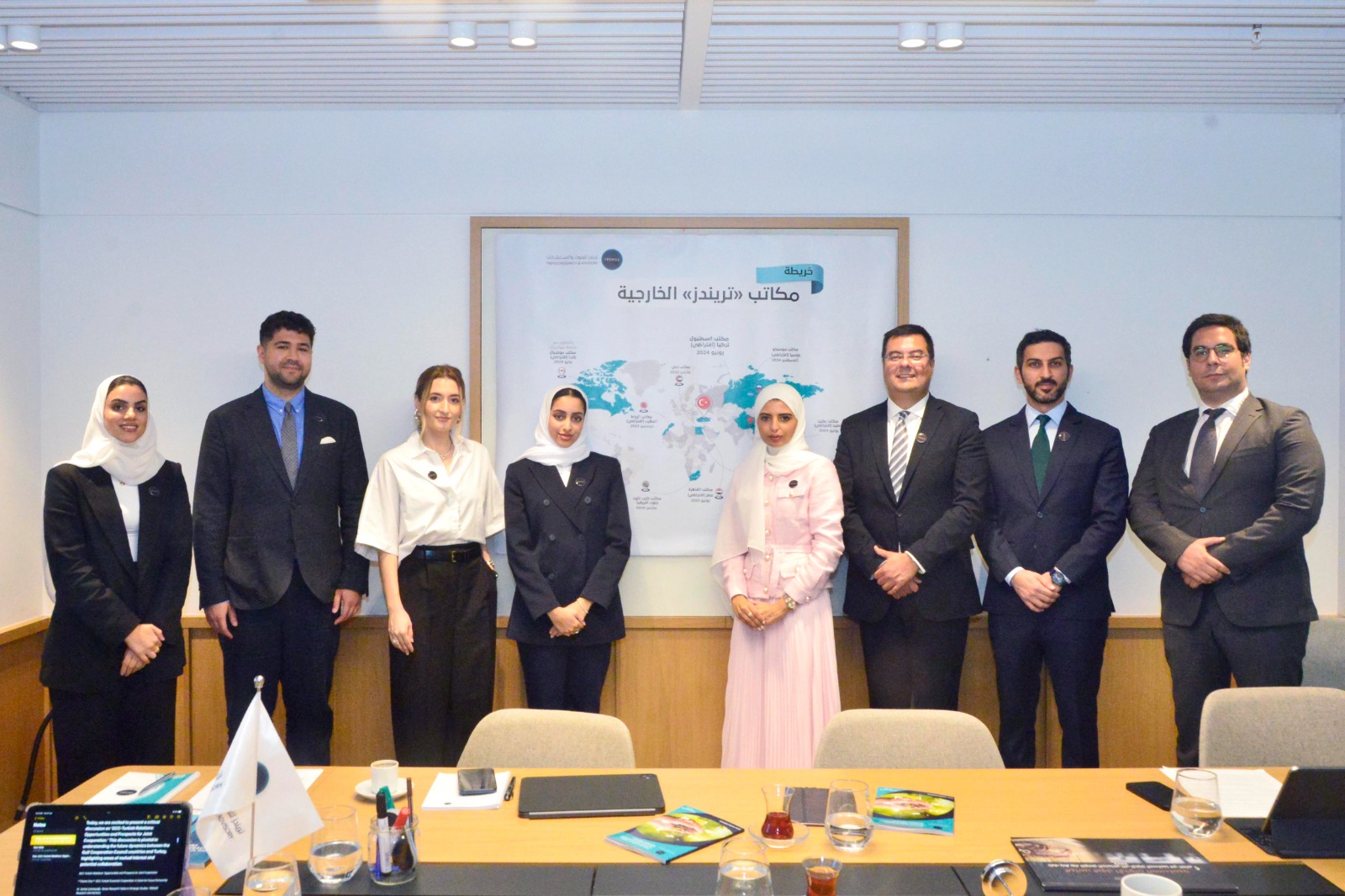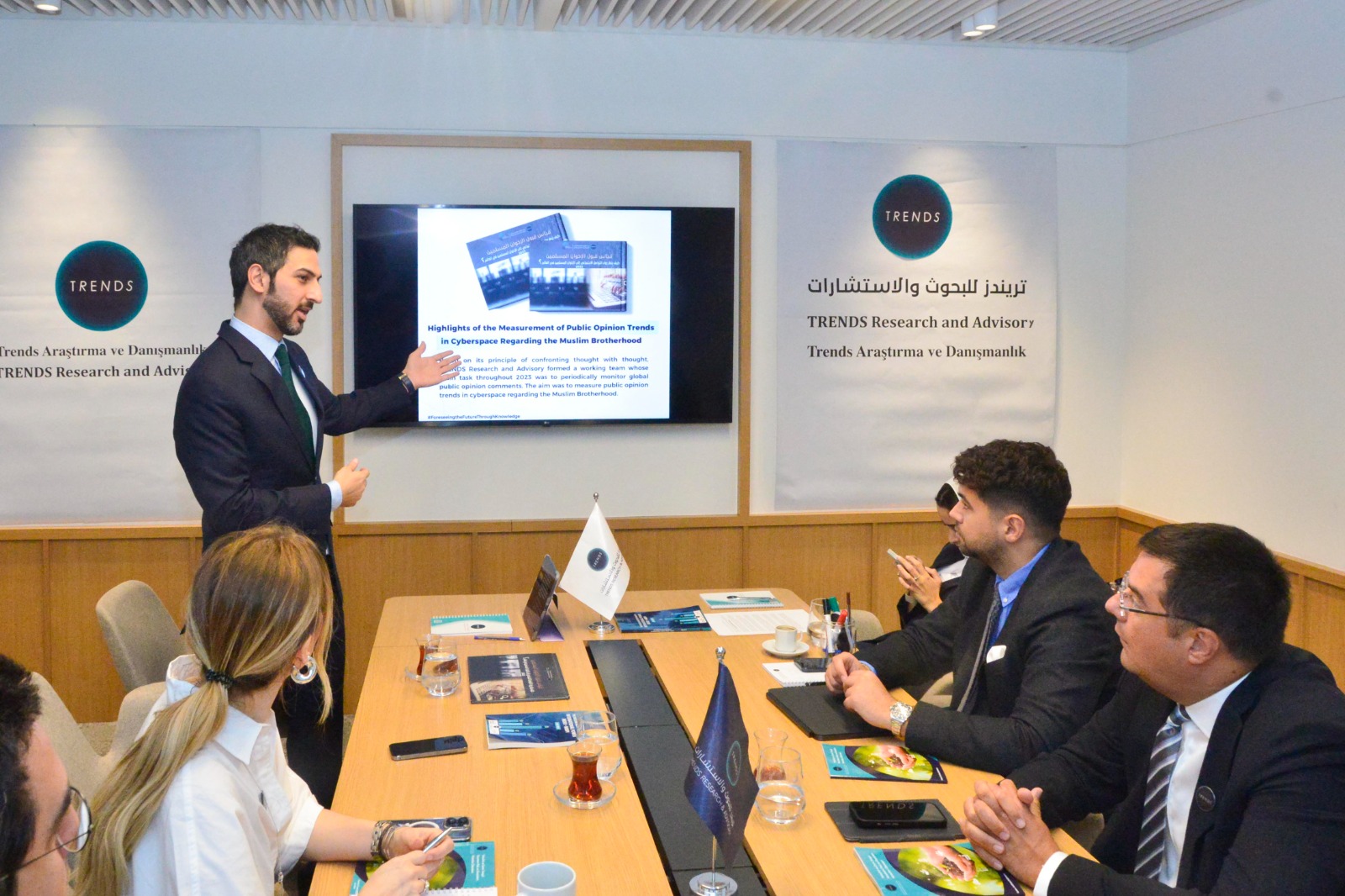A panel discussion on “GCC-Turkish Relations: Opportunities and Prospects for Joint Cooperation” was held by the office of TRENDS Research and Advisory which was inaugurated in Istanbul. The panel discussion was attended by Turkish research centers.
During the panel discussion, experts and researchers emphasized the depth of Turkish-GCC relations and the keenness of Arab Gulf states and Türkiye to strengthen them in a way that would contribute to achieving prosperity for the entire region. They also underlined that both sides have great potential and growing common interests and that economic diplomacy plays a significant role in those relations.
During the panel discussion, which was moderated by Elyazia Al-Hosani, Researcher and Head of TRENDS’ Media Communications Office, researchers and experts from TRENDS and Türkiye discussed various areas of cooperation between the two sides and underlined the importance of strengthening relations and building bridges of cooperation in various fields.
 The speakers, namely TRENDS researcher Najla Al-Midfa and Shamma Al-Qutbah, and Dr. Serhat Çubukçoğlu, Senior Research Fellow in Strategic Studies and Director of TRENDS’ office in Türkiye, as well as Batu Coşkun, a political analyst specializing in Turkish affairs, discussed economic pragmatism in GCC-Turkish relations. They pointed out that the two sides attach utmost importance to economic cooperation and seek to increase the volume of joint trade and investments.
The speakers explained that the GCC countries boast enormous oil and gas resources while Türkiye has extensive experience in the defense industry, hospitality and construction sectors. They pointed out that energy is a major area of cooperation between the two sides, with a focus on technology transfer and innovation to improve the efficiency of energy production. They added that the emerging hydrogen economy offers a new opportunity for cooperation, as the GCC countries and Türkiye can benefit from their resources and industrial capabilities to produce, store and distribute hydrogen.
The speakers, namely TRENDS researcher Najla Al-Midfa and Shamma Al-Qutbah, and Dr. Serhat Çubukçoğlu, Senior Research Fellow in Strategic Studies and Director of TRENDS’ office in Türkiye, as well as Batu Coşkun, a political analyst specializing in Turkish affairs, discussed economic pragmatism in GCC-Turkish relations. They pointed out that the two sides attach utmost importance to economic cooperation and seek to increase the volume of joint trade and investments.
The speakers explained that the GCC countries boast enormous oil and gas resources while Türkiye has extensive experience in the defense industry, hospitality and construction sectors. They pointed out that energy is a major area of cooperation between the two sides, with a focus on technology transfer and innovation to improve the efficiency of energy production. They added that the emerging hydrogen economy offers a new opportunity for cooperation, as the GCC countries and Türkiye can benefit from their resources and industrial capabilities to produce, store and distribute hydrogen.
 Experts and researchers from TRENDS and Türkiye also touched on the strategic location of the two sides. They explained that Türkiye constitutes a bridge between the energy markets in the GCC countries and Europe, which facilitates connectivity and integration between energy networks, and that cooperation between Türkiye and the GCC can play an important role in resolving regional conflicts.
Speakers at the panel discussion in Istanbul stated that joint research initiatives between Turkish universities and research centers in the GCC countries aim to develop unique solutions in the field of energy that are specifically designed to suit the diverse climate and geographical conditions in the region. They stressed that this cooperative approach seeks to achieve breakthroughs in sustainable energy technologies and has the potential to shape the future of energy production both within the region and beyond.
Experts and researchers from TRENDS and Türkiye also touched on the strategic location of the two sides. They explained that Türkiye constitutes a bridge between the energy markets in the GCC countries and Europe, which facilitates connectivity and integration between energy networks, and that cooperation between Türkiye and the GCC can play an important role in resolving regional conflicts.
Speakers at the panel discussion in Istanbul stated that joint research initiatives between Turkish universities and research centers in the GCC countries aim to develop unique solutions in the field of energy that are specifically designed to suit the diverse climate and geographical conditions in the region. They stressed that this cooperative approach seeks to achieve breakthroughs in sustainable energy technologies and has the potential to shape the future of energy production both within the region and beyond.
 The panel discussion, which was attended by representatives of several Turkish research centers and academics, concluded that the GCC-Turkish relations offer promising opportunities for joint cooperation in various fields, especially the economy and energy, and that strengthening those relations will contribute to achieving development and stability in the region.
The launch of a book and two indicators
On the sidelines of the panel discussion, TRENDS’ Istanbul office launched the Turkish version of a study entitled “Poverty and the Environment: The Role of Social Protection and Payment for Ecological Services”; an index that measures the attitudes of online users towards the Muslim Brotherhood; and the Muslim Brotherhood’s International Power Index (MBIPI), which is the world’s first and only indicator that measures, using quantitative and qualitative scientific methods, the influence of the Muslim Brotherhood at the international level. It has so far been launched in Arabic, English, French and Chinese.
The Index was developed by TRENDS in collaboration with the University of Montreal, Canada, and the University Platform for Research on Islam (Pluriel). The results of the index revealed that in 2023, Asia has become the region that contributes most to the power of the Brotherhood internationally. In addition, the Brotherhood’s power increased in Africa and declined in the Arab world and Europe.
Nasser Mohammed Al-Ali, Director of the Human Resources Department at TRENDS, said that the Index constitutes an important tool for understanding developments related to the Muslim Brotherhood internationally and provides an objective analysis of the group’s influence in various fields. He noted that the launch of the international version in several countries stems from TRENDS’ keenness to expand the international community’s awareness of the dangers of the Brotherhood and to enhance international cooperation to combat its extremist ideas.
He stated that the measurement of attitudes of online users towards the Muslim Brotherhood analyzes how social media users viewed the Muslim Brotherhood during the period from January 1 to December 31, 2023. The measurement also monitors everything that was written about the Muslim Brotherhood with the aim of building a measurement about its popularity, as well as measuring global public opinion trends towards the group.
The measurement relies on building a SWOT analytical model based on 4 main elements, namely strengths, weaknesses, threats, and explaining the opportunities available to deal with Brotherhood mentions on social media platforms.
The panel discussion, which was attended by representatives of several Turkish research centers and academics, concluded that the GCC-Turkish relations offer promising opportunities for joint cooperation in various fields, especially the economy and energy, and that strengthening those relations will contribute to achieving development and stability in the region.
The launch of a book and two indicators
On the sidelines of the panel discussion, TRENDS’ Istanbul office launched the Turkish version of a study entitled “Poverty and the Environment: The Role of Social Protection and Payment for Ecological Services”; an index that measures the attitudes of online users towards the Muslim Brotherhood; and the Muslim Brotherhood’s International Power Index (MBIPI), which is the world’s first and only indicator that measures, using quantitative and qualitative scientific methods, the influence of the Muslim Brotherhood at the international level. It has so far been launched in Arabic, English, French and Chinese.
The Index was developed by TRENDS in collaboration with the University of Montreal, Canada, and the University Platform for Research on Islam (Pluriel). The results of the index revealed that in 2023, Asia has become the region that contributes most to the power of the Brotherhood internationally. In addition, the Brotherhood’s power increased in Africa and declined in the Arab world and Europe.
Nasser Mohammed Al-Ali, Director of the Human Resources Department at TRENDS, said that the Index constitutes an important tool for understanding developments related to the Muslim Brotherhood internationally and provides an objective analysis of the group’s influence in various fields. He noted that the launch of the international version in several countries stems from TRENDS’ keenness to expand the international community’s awareness of the dangers of the Brotherhood and to enhance international cooperation to combat its extremist ideas.
He stated that the measurement of attitudes of online users towards the Muslim Brotherhood analyzes how social media users viewed the Muslim Brotherhood during the period from January 1 to December 31, 2023. The measurement also monitors everything that was written about the Muslim Brotherhood with the aim of building a measurement about its popularity, as well as measuring global public opinion trends towards the group.
The measurement relies on building a SWOT analytical model based on 4 main elements, namely strengths, weaknesses, threats, and explaining the opportunities available to deal with Brotherhood mentions on social media platforms.
 The speakers, namely TRENDS researcher Najla Al-Midfa and Shamma Al-Qutbah, and Dr. Serhat Çubukçoğlu, Senior Research Fellow in Strategic Studies and Director of TRENDS’ office in Türkiye, as well as Batu Coşkun, a political analyst specializing in Turkish affairs, discussed economic pragmatism in GCC-Turkish relations. They pointed out that the two sides attach utmost importance to economic cooperation and seek to increase the volume of joint trade and investments.
The speakers explained that the GCC countries boast enormous oil and gas resources while Türkiye has extensive experience in the defense industry, hospitality and construction sectors. They pointed out that energy is a major area of cooperation between the two sides, with a focus on technology transfer and innovation to improve the efficiency of energy production. They added that the emerging hydrogen economy offers a new opportunity for cooperation, as the GCC countries and Türkiye can benefit from their resources and industrial capabilities to produce, store and distribute hydrogen.
The speakers, namely TRENDS researcher Najla Al-Midfa and Shamma Al-Qutbah, and Dr. Serhat Çubukçoğlu, Senior Research Fellow in Strategic Studies and Director of TRENDS’ office in Türkiye, as well as Batu Coşkun, a political analyst specializing in Turkish affairs, discussed economic pragmatism in GCC-Turkish relations. They pointed out that the two sides attach utmost importance to economic cooperation and seek to increase the volume of joint trade and investments.
The speakers explained that the GCC countries boast enormous oil and gas resources while Türkiye has extensive experience in the defense industry, hospitality and construction sectors. They pointed out that energy is a major area of cooperation between the two sides, with a focus on technology transfer and innovation to improve the efficiency of energy production. They added that the emerging hydrogen economy offers a new opportunity for cooperation, as the GCC countries and Türkiye can benefit from their resources and industrial capabilities to produce, store and distribute hydrogen.
 Experts and researchers from TRENDS and Türkiye also touched on the strategic location of the two sides. They explained that Türkiye constitutes a bridge between the energy markets in the GCC countries and Europe, which facilitates connectivity and integration between energy networks, and that cooperation between Türkiye and the GCC can play an important role in resolving regional conflicts.
Speakers at the panel discussion in Istanbul stated that joint research initiatives between Turkish universities and research centers in the GCC countries aim to develop unique solutions in the field of energy that are specifically designed to suit the diverse climate and geographical conditions in the region. They stressed that this cooperative approach seeks to achieve breakthroughs in sustainable energy technologies and has the potential to shape the future of energy production both within the region and beyond.
Experts and researchers from TRENDS and Türkiye also touched on the strategic location of the two sides. They explained that Türkiye constitutes a bridge between the energy markets in the GCC countries and Europe, which facilitates connectivity and integration between energy networks, and that cooperation between Türkiye and the GCC can play an important role in resolving regional conflicts.
Speakers at the panel discussion in Istanbul stated that joint research initiatives between Turkish universities and research centers in the GCC countries aim to develop unique solutions in the field of energy that are specifically designed to suit the diverse climate and geographical conditions in the region. They stressed that this cooperative approach seeks to achieve breakthroughs in sustainable energy technologies and has the potential to shape the future of energy production both within the region and beyond.
 The panel discussion, which was attended by representatives of several Turkish research centers and academics, concluded that the GCC-Turkish relations offer promising opportunities for joint cooperation in various fields, especially the economy and energy, and that strengthening those relations will contribute to achieving development and stability in the region.
The launch of a book and two indicators
On the sidelines of the panel discussion, TRENDS’ Istanbul office launched the Turkish version of a study entitled “Poverty and the Environment: The Role of Social Protection and Payment for Ecological Services”; an index that measures the attitudes of online users towards the Muslim Brotherhood; and the Muslim Brotherhood’s International Power Index (MBIPI), which is the world’s first and only indicator that measures, using quantitative and qualitative scientific methods, the influence of the Muslim Brotherhood at the international level. It has so far been launched in Arabic, English, French and Chinese.
The Index was developed by TRENDS in collaboration with the University of Montreal, Canada, and the University Platform for Research on Islam (Pluriel). The results of the index revealed that in 2023, Asia has become the region that contributes most to the power of the Brotherhood internationally. In addition, the Brotherhood’s power increased in Africa and declined in the Arab world and Europe.
Nasser Mohammed Al-Ali, Director of the Human Resources Department at TRENDS, said that the Index constitutes an important tool for understanding developments related to the Muslim Brotherhood internationally and provides an objective analysis of the group’s influence in various fields. He noted that the launch of the international version in several countries stems from TRENDS’ keenness to expand the international community’s awareness of the dangers of the Brotherhood and to enhance international cooperation to combat its extremist ideas.
He stated that the measurement of attitudes of online users towards the Muslim Brotherhood analyzes how social media users viewed the Muslim Brotherhood during the period from January 1 to December 31, 2023. The measurement also monitors everything that was written about the Muslim Brotherhood with the aim of building a measurement about its popularity, as well as measuring global public opinion trends towards the group.
The measurement relies on building a SWOT analytical model based on 4 main elements, namely strengths, weaknesses, threats, and explaining the opportunities available to deal with Brotherhood mentions on social media platforms.
The panel discussion, which was attended by representatives of several Turkish research centers and academics, concluded that the GCC-Turkish relations offer promising opportunities for joint cooperation in various fields, especially the economy and energy, and that strengthening those relations will contribute to achieving development and stability in the region.
The launch of a book and two indicators
On the sidelines of the panel discussion, TRENDS’ Istanbul office launched the Turkish version of a study entitled “Poverty and the Environment: The Role of Social Protection and Payment for Ecological Services”; an index that measures the attitudes of online users towards the Muslim Brotherhood; and the Muslim Brotherhood’s International Power Index (MBIPI), which is the world’s first and only indicator that measures, using quantitative and qualitative scientific methods, the influence of the Muslim Brotherhood at the international level. It has so far been launched in Arabic, English, French and Chinese.
The Index was developed by TRENDS in collaboration with the University of Montreal, Canada, and the University Platform for Research on Islam (Pluriel). The results of the index revealed that in 2023, Asia has become the region that contributes most to the power of the Brotherhood internationally. In addition, the Brotherhood’s power increased in Africa and declined in the Arab world and Europe.
Nasser Mohammed Al-Ali, Director of the Human Resources Department at TRENDS, said that the Index constitutes an important tool for understanding developments related to the Muslim Brotherhood internationally and provides an objective analysis of the group’s influence in various fields. He noted that the launch of the international version in several countries stems from TRENDS’ keenness to expand the international community’s awareness of the dangers of the Brotherhood and to enhance international cooperation to combat its extremist ideas.
He stated that the measurement of attitudes of online users towards the Muslim Brotherhood analyzes how social media users viewed the Muslim Brotherhood during the period from January 1 to December 31, 2023. The measurement also monitors everything that was written about the Muslim Brotherhood with the aim of building a measurement about its popularity, as well as measuring global public opinion trends towards the group.
The measurement relies on building a SWOT analytical model based on 4 main elements, namely strengths, weaknesses, threats, and explaining the opportunities available to deal with Brotherhood mentions on social media platforms.



